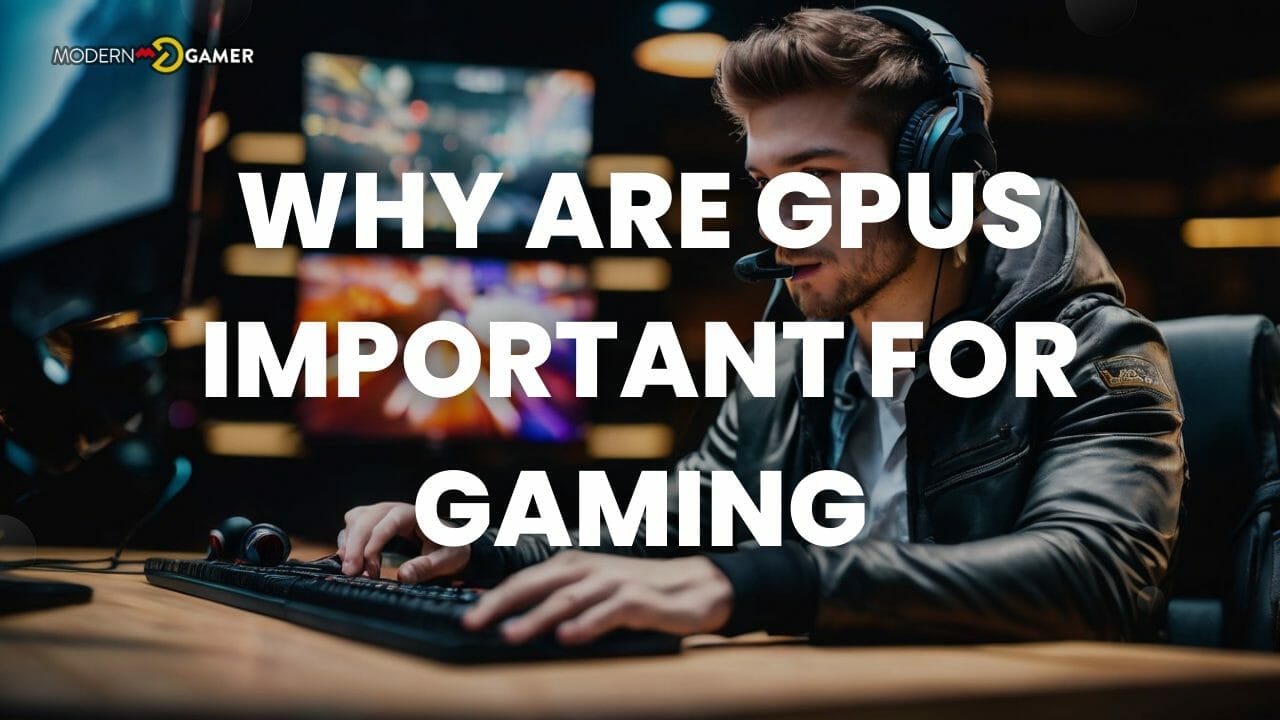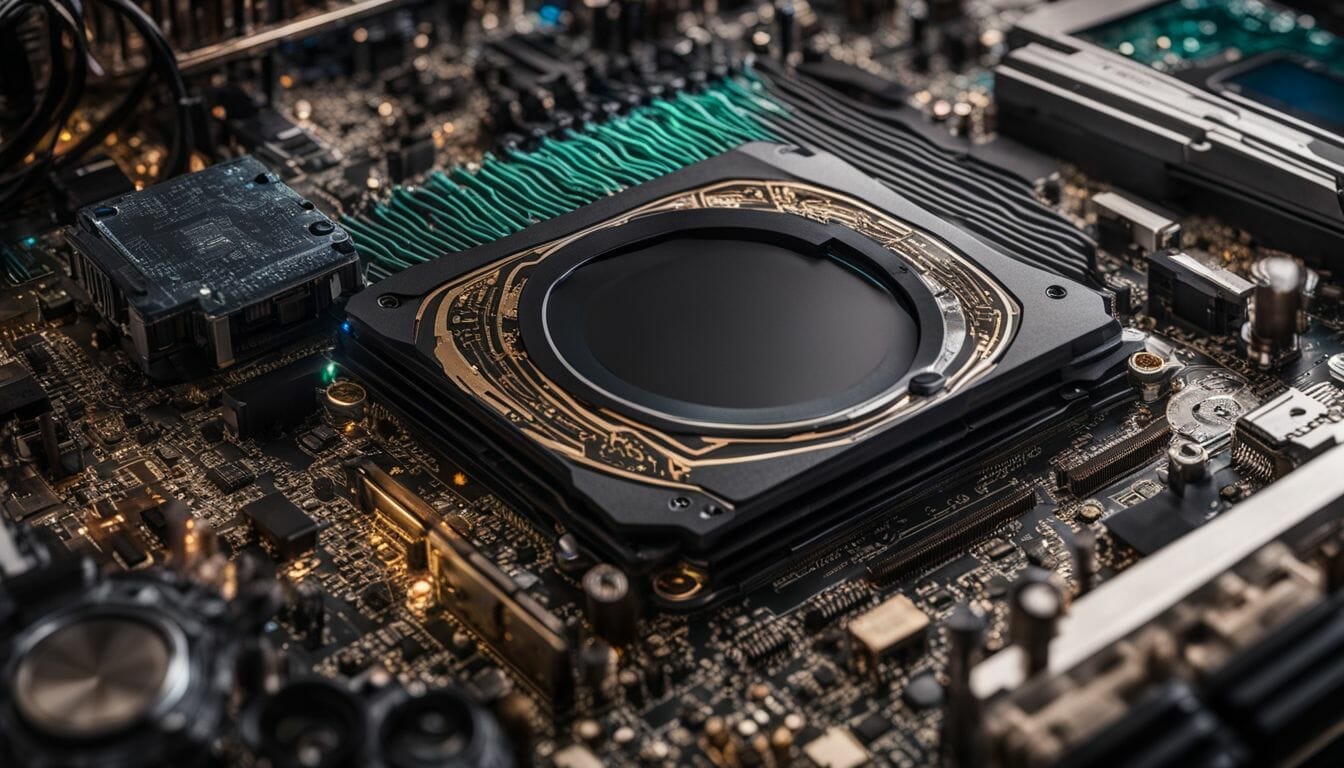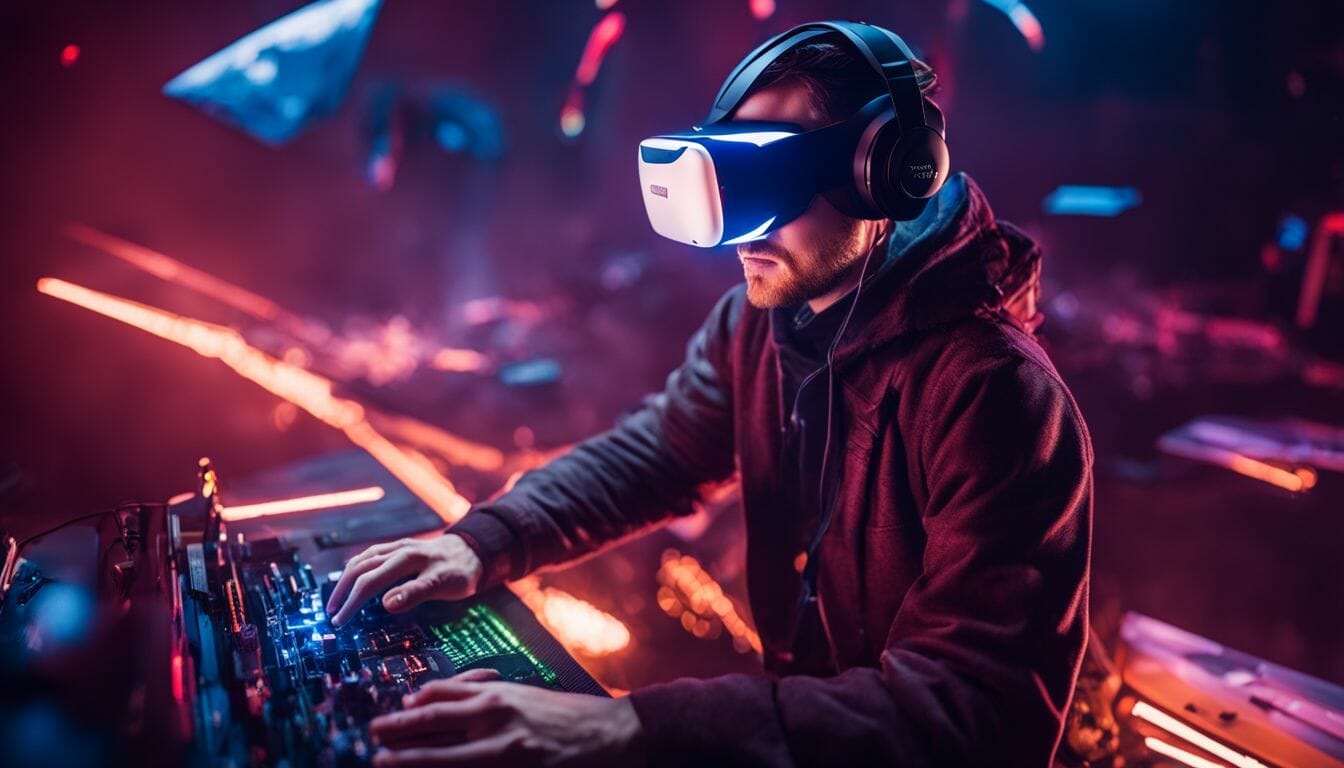The Game Changer: Why Are GPUs Important for Gaming

Wondering why experts say a top-notch GPU makes gaming better? That question popped up here too, leading to a deep dive into why the Graphics Processing Unit stands as a must-have gear. Gamers who want smooth, crisp visuals and fast gameplay find that a good GPU turns their rig into a beast. It’s like the heart pumping power and beauty into every frame. Fun fact: some cards process over 10 billion operations per second, making lag almost a thing of the past. If speed and sharp graphics matter, knowing what a GPU does will change the game completely. Keep reading to discover how this gadget can lift your play to new heights.
In this blog post, we will unravel the mystery behind GPUs and their significance in delivering high-quality gaming performance. Get ready – it’s time to enhance your knowledge and ultimately transform your gameplay!
Key Takeaways
- GPUs, or Graphics Processing Units, are crucial for gaming as they handle the heavy computational tasks required for rendering complex graphics and delivering high-quality visual experiences.
- GPUs enhance the visual quality of games by rapidly calculating and rendering high – quality graphics, resulting in detailed textures, realistic lighting effects, smooth animations, and vibrant colors.
- A powerful GPU ensures a smooth gameplay experience with fluid movements, sharp details, and vibrant colors. It also improves performance by reducing delays and input lag.
- GPUs are important for achieving higher frame rates in gaming. Higher frame rates lead to smoother gameplay and a more immersive experience overall.
What is a GPU and Why is it Important for Gaming?

A GPU, or Graphics Processing Unit, is a specialized electronic circuit that is designed to rapidly manipulate and alter memory in order to accelerate the creation of images in a frame buffer intended for output to a display device.
In gaming, GPUs play a crucial role as they offload the heavy computational tasks required for rendering complex graphics and deliver high-quality visual experiences.
Definition of a GPU
A GPU, or Graphics Processing Unit, is like the brain of a computer for pictures and video. It’s a chip that does math to make graphics. This chip fits into a part on your computer called an “x16 slot” on your motherboard.
More than just for games, GPUs do heavy-duty work in fields like deep learning too!
Role of a GPU in gaming
In gaming, the GPU is like a hard worker. It does all the math to draw every image we see in games. The GPU’s main job is to carry out many calculations at once. This helps it quickly render game visuals and images on your screen.
By doing this work, the GPU lets the CPU focus more on game logic and physics equations that make games feel real. Both integrated and discrete GPUs have roles here, but for better gaming we suggest using a dedicated one for clear visuals even in fast-paced scenes.
We enjoy smoother gameplay because of how well CPUs and GPUs work together!
Graphics processing and rendering
We all want our games to look good. That’s why the GPU, or graphics processing unit, is so key. It’s a chip in your computer that handles the big task of making images for your screen.
These chips are built just for making graphics look top-notch. They take on hard math problems to make sure each image gets rendered fast and clean. This keeps your CPU free from this heavy work, letting it handle other tasks while the GPU makes sure our game visuals pop!
The Importance of GPUs for Gaming Performance

A GPU is crucial for gaming performance as it enhances visual quality, ensures a smooth gameplay experience, allows for higher frame rates, and handles complex graphics with ease.
Enhanced visual quality
Our gaming experience is greatly enhanced by the visual quality offered by GPUs. These powerful graphics processing units are designed to rapidly calculate and render high-quality graphics and images in games.
They prioritize factors like resolution, image sharpness, color vibrancy, and overall visual aesthetics to create a visually stunning gaming environment. With a dedicated GPU, you can enjoy games with detailed textures, realistic lighting effects, smooth animations, and vibrant colors.
Not only does this make everything look more appealing, but it also adds depth and immersion to your gameplay. So whether you’re exploring an expansive open world or engaging in fast-paced action sequences, the enhanced visual quality delivered by GPUs truly elevates your gaming experience.
Smooth gameplay experience
Having a smooth gameplay experience is essential for any PC gamer. It’s what makes the game enjoyable and immersive. And you know what? GPUs play a major role in ensuring that smoothness.
Powerful graphics cards are responsible for processing the graphics and rendering them on your screen in real-time. They handle all the calculations, so you can have high-quality visuals without any lag or stuttering.
With a high-performing GPU, you can enjoy seamless gameplay with fluid movements, sharp details, and vibrant colors. So whether you’re exploring vast open-world environments or engaging in intense battles, a powerful GPU is key to delivering that smooth gaming experience you crave.
But it’s not just about the visual appeal; having a smooth gameplay experience also influences your performance as a player. When your GPU can process information quickly and efficiently, it means faster response times and better overall gameplay.
You won’t have to deal with frustrating delays or input lag that can compromise your performance during crucial moments of the game. Plus, if you’re into competitive gaming or esports, having a high FPS (frames per second) rate gives you an edge over your opponents by providing smoother motion and more accurate aiming.
Higher frame rates
Having higher frame rates is crucial for an optimal gaming experience. When the frame rate is high, it means that your graphics card is delivering more frames per second (FPS). This leads to smoother gameplay and a more immersive experience overall.
Additionally, high frame rates are especially important in competitive gaming, such as esports, where every millisecond matters. With a faster graphics card and higher FPS, you can react faster to what’s happening on screen and gain an edge over your opponents.
So if you want to enjoy games with stunning visuals and responsive gameplay, investing in a GPU that can deliver higher frame rates is definitely worth considering.
Ability to handle complex graphics
One of the crucial reasons why GPUs are important for gaming is their ability to handle complex graphics. Whether you’re exploring vast virtual worlds or engaging in intense battles, your gaming experience heavily relies on visually stunning graphics.
GPUs play a vital role in processing and rendering these intricate visuals, ensuring that every detail appears vivid and lifelike on your screen.
With their high processing throughput, GPUs excel at tackling demanding graphical tasks. They can swiftly calculate and handle a massive amount of information needed to display realistic shadows, lighting effects, textures, and other visual elements.
This enables you to enjoy immersive gameplay with breathtaking environments and visually stunning characters.
Moreover, the ability of GPUs to handle complex graphics extends beyond gaming. Many creative professionals rely on powerful GPUs for tasks like video editing and 3D graphics rendering.
These professionals need hardware that can process large amounts of data quickly while maintaining smooth performance.
Differences Between GPUs and CPUs in Gaming
GPUs excel at parallel processing and are specifically designed for handling complex graphics, while CPUs are better suited for general-purpose computing tasks.
GPU vs. CPU capabilities
When it comes to gaming, the capabilities of GPUs and CPUs play significant roles. However, they differ in some key aspects. Let’s illustrate this in the table below:
| Graphics Processing Unit (GPU) | Central Processing Unit (CPU) |
|---|---|
| GPUs are designed to handle complex graphics computations, making them essential for high-quality gaming. They can break complex problems into thousands or even millions of separate tasks, making them ideal for rendering in games. | CPUs are designed for general-purpose computing. Although they also play a role in gaming, they are primarily used to handle tasks such as operating system functions, running applications, and many more. They consume or require more memory than GPUs. |
| GPUs play a major role in achieving smooth gameplay and higher frame rates in gaming. Their architecture is optimized for high computational throughput required in gaming. | CPUs are essential for performing basic instructions in a computer system. However, they might struggle with the high computational demands of modern games if used without a dedicated GPU. |
| GPUs are becoming increasingly vital in the field of AI and deep learning applications, along with gaming. Their design allows them to perform these tasks more efficiently than CPUs. | While CPUs are versatile and can handle a wide range of tasks, they are not as efficient as GPUs when it comes to graphics computations and simultaneous processing required in gaming. |
Choosing a good GPU can significantly enhance your gaming experience, thanks to its specialized capabilities in graphics processing. That’s not to downplay the importance of CPUs, but when it comes to high-performance gaming, a dedicated GPU is often non-negotiable.
Importance of a dedicated GPU for gaming
A dedicated GPU is extremely important for gaming. It plays a crucial role in delivering high-quality graphics and ensuring smooth gameplay. Unlike CPUs, GPUs are specially designed to handle complex graphical tasks efficiently.
They have the power to process and render graphics at a faster rate, resulting in higher frame rates and enhanced visual quality. With a dedicated GPU, you can enjoy an optimal gaming experience with fast processing and stunning graphics.
So, if you’re serious about gaming, investing in a dedicated graphics card is essential for top-notch performance and immersive gameplay.
How to Choose the Right GPU for Gaming
When choosing the right GPU for gaming, there are a few important considerations to keep in mind.
Considerations for GPU selection
When choosing a GPU for gaming, there are important factors to consider. Here are some considerations for GPU selection:
- Performance: Look for a GPU that offers high performance to ensure smooth gameplay and fast loading times.
- Budget: Determine how much you are willing to spend on a graphics card. Consider the balance between price and performance.
- Compatibility: Check if the GPU is compatible with your existing hardware, such as your motherboard and power supply.
- Graphics quality: Consider the level of graphic quality you desire in games. Look for a GPU that can handle higher resolutions and advanced graphical effects.
- Ray-tracing technology: If you want more realistic lighting and reflections in your games, consider GPUs that support ray-tracing technology.
- Cooling solution: Some GPUs come with different cooling options, such as fans or liquid cooling. Choose one that suits your needs and helps keep the temperature down during intense gaming sessions.
- Future-proofing: Think about whether you want a GPU that will be able to handle future games and advancements in technology.
Budget and performance requirements
When choosing a graphics card for gaming, it’s important to consider your budget and performance requirements. You want to find a card that offers the right balance between price and quality.
Think about how much you’re willing to spend on a graphics card and what kind of gaming experience you’re looking for.
One important factor to consider is the amount of GPU RAM, or memory, that the graphics card has. Gamers and creative professionals should aim for a graphics card with at least 4GB of GPU RAM.
This will ensure smooth gameplay and better visual quality.
Another thing to think about is the performance requirements of your favorite games. Some games have higher graphic demands than others, so make sure your chosen graphics card can handle them without any issues.
It’s also worth noting that newer games tend to have more advanced graphics, so if you plan on playing those, you might need a more powerful graphics card.
Compatibility with other hardware
When choosing the right GPU for gaming, it’s important to consider its compatibility with other hardware. Here are some factors you should keep in mind:
- Make sure the GPU is compatible with your motherboard. Check if it fits into the PCIe slot and if it meets the power requirements.
- Consider the compatibility with your power supply unit (PSU). Ensure that the GPU’s power consumption is supported by your PSU.
- The GPU should work well with your CPU to ensure optimal gaming performance. Look for compatibility between these two components.
- Check if the GPU supports your monitor’s resolution and refresh rate. This ensures smooth gameplay and high-quality visuals.
Conclusion
In conclusion, GPUs are incredibly important for gaming. They handle the rendering of graphics, which improves performance and enhances visual quality in games. With the increasing demand for high-quality graphics in modern games, having a good GPU is essential to ensure a smooth and enjoyable gaming experience.
So if you’re a PC gamer looking to take your gaming to the next level, investing in a powerful GPU is definitely worth considering.
FAQs
1. What is a GPU and why is it important for gaming?
A GPU, or Graphics Processing Unit, is an essential component of a gaming computer that handles graphics rendering, allowing for smooth and realistic visuals in games.
2. Can I play games without a dedicated GPU?
Yes, you can still play some less demanding games without a dedicated GPU by relying on the integrated graphics capabilities of your CPU. However, for more graphically intensive games and optimal performance, having a dedicated GPU is highly recommended.
3. How does a powerful GPU improve my gaming experience?
A powerful GPU enhances your gaming experience by providing higher frame rates (resulting in smoother gameplay), better graphics quality (including details and textures), and enabling advanced features like ray tracing or virtual reality.
4. Are all GPUs compatible with any gaming computer?
No, not all GPUs are compatible with every gaming computer as compatibility depends on factors such as the type of PCIe slot available on the motherboard, power supply requirements, and physical space inside the computer case. It’s important to check these specifications before purchasing a new GPU.
5. Do I need to upgrade my existing GPU for better gaming performance?
If you’re experiencing lagging or poor graphics quality in newer games, upgrading your existing GPU might help improve your gaming performance. However, it’s also important to consider other hardware components like CPU and RAM to ensure overall system balance for optimal results.
